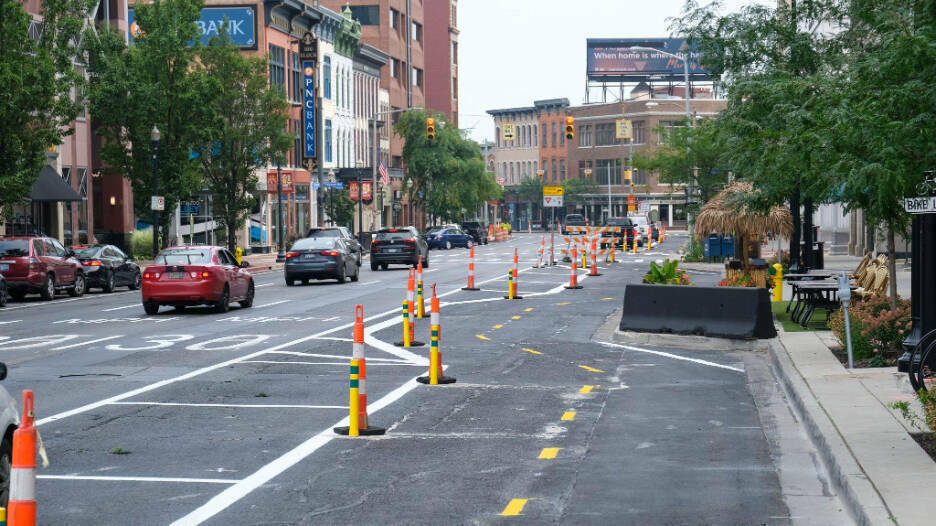School of Architecture charrette yields $98M for downtown Kalamazoo public space regeneration

On June 27, the city of Kalamazoo, Michigan, announced that it was awarded a $25 million grant through the U.S. Department of Transportation’s Rebuilding American Infrastructure with Sustainability and Equity (RAISE) program, as a result of its work with the University of Notre Dame School of Architecture.
The grant, which will support the restructuring of downtown Kalamazoo thoroughfares and public spaces, is the latest of $98 million in grant funding the city has received following an intense, weeklong urban planning session conducted by the School of Architecture’s Housing and Community Regeneration Initiative in August 2022. Known as a Dean’s Charrette, the process resulted in a comprehensive plan to revitalize Kalamazoo’s downtown.
“This grant is but one of an extraordinary total of $98 million the city has received based on the design, visions, ideas and final recommendations of the project completed by the Housing and Community Regeneration Initiative,” said Rebekah Kik, Kalamazoo assistant city manager.
The initiative began in 2021 and has conducted six charrettes in southwest Michigan and northern Indiana. Through its 100-Mile Coalition, it seeks to partner with communities within a 100-mile radius of the University of Notre Dame.
“Our work in Kalamazoo has resulted in the most ambitious regeneration work within the 100-Mile Coalition region since we began the Dean’s Charrettes,” said Stefanos Polyzoides, the Francis and Kathleen Rooney Dean of the Notre Dame School of Architecture.
“We expect similar excellent outcomes going forward because the need to listen to the people of each community to help them rebuild their downtowns and urban neighborhoods is immense. This incredible amount of funding — and the benefits it brings to Kalamazoo — is the ideal outcome for our community-building efforts.”
Marianne Cusato, director of the School of Architecture’s Housing and Community Regeneration Initiative, co-led the Kalamazoo charrette process with Polyzoides.
“The initiative’s charrettes conducted in northern Indiana and southwest Michigan are one of the school’s avenues to positively impact regional communities that have been long disenfranchised,” she said.
The latest $25 million award will fund the rebuilding of the current six-lane, one-way Michigan Avenue, which is downtown Kalamazoo’s main street. The city has received two other grants to assist with the planning, design and engineering of its streets and public spaces.
Through the city’s Streets For All program, downtown streets will be redesigned to provide safe transportation for everyone in the community and to foster a welcoming, inclusive downtown by calming traffic and restoring two-way operations. During the next several years, the streets will be converted to two-way traffic, be modernized with underground utilities and incorporate people-focused, street-level designs. Construction on the street segments is expected to begin in August 2027, Kik said.
Ultimately, Cusato said, the goal is to create human-scale, walkable communities by repairing abandoned, vacant and underused properties; reducing critical housing shortages; addressing inequalities that result from a legacy of housing and transportation policies; restoring blighted historic properties while minimizing displacement; and mitigating the impact of climate change through sustainable development patterns of growth.
“While this work is the cornerstone of our service mission at the School of Architecture and for the Housing and Community Regeneration Initiative, it also serves as a foundation for a body of research that seeks to find solutions that address similar critical issues facing cities throughout our region and across the country,” she said.
Media contact: Carrie Gates, associate director of media relations, c.gates@nd.edu
Latest ND NewsWire
- Notre Dame Lead Innovation Team partners with local WIC program to identify, prevent lead poisoning in childrenB.A.B.E. store “shoppers” now have something new to help their families: free lead screening kits offered by the University of Notre Dame’s Lead Innovation Team.
- Vatican honors Martin and Carmel Naughton with papal awardThe late Pope Francis, in one of his last acts, conferred the honour of the Order of Saint Gregory the Great upon Carmel and Martin Naughton, Trustee Emeritus of the University of Notre Dame. The papal honor is in recognition of the Naughtons’ outstanding philanthropy in the areas of education and the arts, particularly in the provision of philanthropic support and scholarships to Catholic education at the University of Notre Dame and Kylemore Abbey, and in their transformative contributions to higher education in Ireland.
- Brain tumor growth patterns may help inform patient care managementAssistant Professor Meenal Datta (University of Notre Dame/Wes Evard) A team of researchers from the University of Notre Dame, Harvard Medical School/Massachusetts General Hospital, and Boston University has developed a technique for measuring a brain tumor’s mechanical force and a new model to estimate how much brain tissue a patient has lost.
- Notre Dame elects two new TrusteesTwo new Trustees — John F. Crowley and Danielle Walker Merfeld — have been elected to serve on the University of Notre Dame’s Board of Trustees effective July 1. …
- From reaction to resolution: The future of allergy treatmentTwelve-year-old Lauren Eglite was thrilled to attend a Notre Dame football game with her father, Erik, in 2017, even though her acute peanut allergy demands constant vigilance. She was even more excited when the stadium’s brand-new video board aired an NBC Fighting…
- Notre Dame student uses ‘American Ninja Warrior’ spotlight to fight world hunger via his nonprofitOn July 14 (Monday), a University of Notre Dame business student will compete in the semifinal round of NBC’s “American Ninja Warrior” to advocate for an end to world hunger, an ambition he works toward by making knotted dog toys and collecting donations to his nonprofit.












